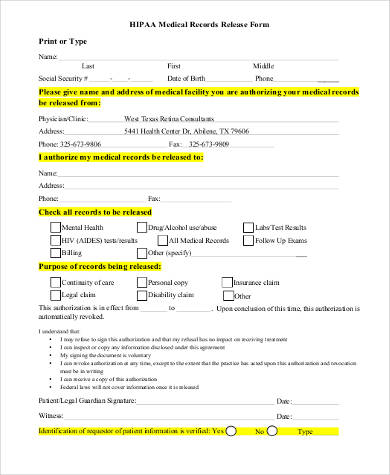
For The Liability Release You Need. Search For Hipaa Compliant Release Form Now! What does release of medical records mean? Find Hipaa Compliant Release Form. What is the policy for releasing medical records?
What are patients rights under HIPAA? The medical record information release (HIPAA), also known as the ‘Health Insurance Portability and Accountability Act’, is included in each person’s medical file. This document allows a patient to list the names of family members , friends , clergy , health care providers , or other third (3rd) parties to whom they wish to have made their medical information available.
Only you or your personal representative has the right to access your records. A health care provider or health plan may send copies of your records to another provider or health plan only as needed for treatment or payment or with your permission. The Privacy Rule does not require the health care provider or health plan to share information with other providers or plans.

HIPAA gives you important rights to access - PDF your medical record and to keep your information private. See full list on hhs. A provider cannot deny you a copy of your records because you have not paid for the services you have received. However, a provider may charge for the reasonable costs for copying and mailing the records. The provider cannot charge you a fee for searching for or retrieving your records.
You do not have the right to access a provider’s psychotherapy notes. Psychotherapy notes are notes that a mental health professional takes during a conversation with a patient. They are kept separate from the patient’s medical and billing records.
HIPAA also does not allow the provider to make most disclosures about psychotherapy notes about you without your authorization. If you think the information in your medical or billing record is incorrect, you can request a change, or amendment, to your record. The health care provider or health plan must respond to your request.
If it created the information, it must amend inaccurate or incomplete information. If the provider or plan does not agree to your request, you have the right to submit a statement of disagreement that the provider or plan must add to your record. Yes, but only within specific limits. The Privacy Rule permits a covered entity to impose a reasonable, cost-based fee to provide the individual (or the individual’s personal representative) with a copy of the individual’s PHI, or to direct the copy to a designated third party.
The fee may include only the cost of certain labor, supplies, and postage: 1. Labor for copying the PHI requested by the individual, whether in paper or electronic form. If requested by an individual, a covered entity must transmit an individual’s PHI directly to another person or entity designated by the individual. The individual’s request must be in writing, signed by the individual, and clearly identify the designated person or entity and where to send the PHI. With limited exceptions, the HIPAA Privacy Rule gives individuals the right to access, upon request, the medical and health information (protected health information or PHI) about them in one or more designated record sets maintained by or for the individuals’ health care providers and health plans (HIPAA covered entities). Designated record sets include medical records, billing records, payment and claims records, health plan enrollment records, case management records, a. Under the HIPAA Privacy Rule, a covered entity must act on an individual’s request for access no later than calendar days after receipt of the request.
A covered entity may charge an individual that has requested a copy of her PHI a reasonable, cost-based fee for the copy. However, a covered entity may not withhold or deny an individual access to her PHI on the grounds that the individual has not paid the bill for health care services the covered entity provided to the individual. The HIPAA Privacy Rule provides individuals with the right to access their medical and other health records from their health care providers and health plans, upon request. The Privacy Rule generally also gives the right to access the individual’s health records to a personal representative of the individual.
Under the Rule, an individual’s personal representative is someone authorized under State or other applicable law to act on behalf of the individual in making health care related decisio. Any facsimile , copy or photocopy of the authorization shall authorize you to release the records requested herein. This authorization shall be in force and effect until two years from date of execution at which time this authorization expires. You have likely found.
Online HIPAA Training Certificate. A signed HIPAA release form must be obtained from a patient before their protected health information can be shared for non-standard purposes. Williams has authored and. It is a HIPAA violation to release medical records without a HIPAA authorization form.
When an organization cannot meet this deadline, it can request a 30-day extension with good reason (i.e., natural disaster). Requests from your employer. Medical records are very confidential pieces of documents that are kept off the public limelight ordinarily.
It, alongside a host of state laws, bind healthcare. In such cases, the information disclosed must still be limited to the information specifically requested in the subpoena.
No comments:
Post a Comment
Note: Only a member of this blog may post a comment.